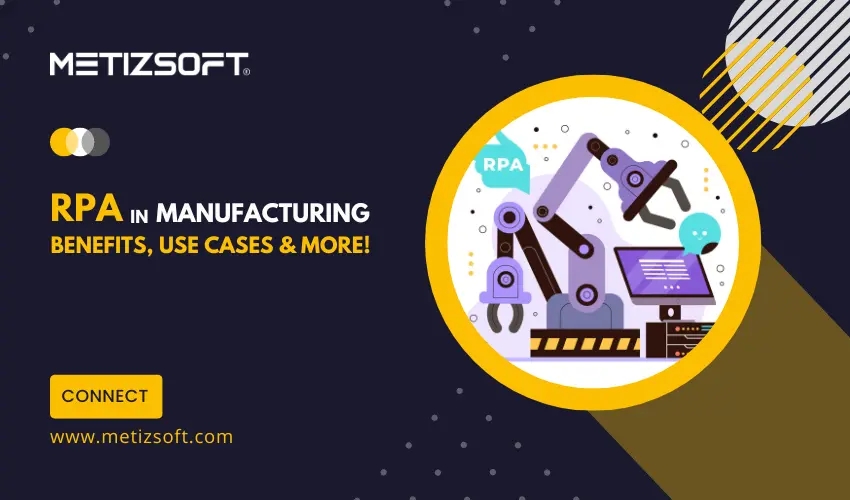
The world isn’t just moving quickly but smartly with the ever-evolving tech stacks. For example, automation! Earlier, billing, replaying to customers, data management, and other operations required human hands, effort, and time. But now they happen in no time, all thanks to automation!
Automation has untouched no industries or sectors in today’s multiplying digital landscape. Robotic Process Automation, aka RPA, has become a new cornerstone for many industries, including manufacturing.
RPA in manufacturing has solved 90% of its issues by streamlining mundane and manual tasks. It has been a game-changing solution for enhancing production, agility, and revenue without worrying about speed, accuracy, and consistency in many sections.
This blog post will explore how RPA benefits the manufacturing industry by reviewing its role, benefits, and use cases.
Table of Contents
Understanding RPA in Manufacturing
In industrial automation, the manufacturing sector has harnessed physical robots for many business tasks, including assembly, production planning, and inventory management. The industry’s growing reliance on streamlined processes has prompted a sharp focus on digital transformation through Robotic Process Automation (RPA). This form of automation is imperative for optimizing core operations and elevating productivity at all levels.
RPA helps automate inventory accounting, regulatory compliance, purchase orders, invoice verification, and customer service. This automation reduces repetitive tasks and allows organizations to focus on improving quality and growth.
Benefits RPA Brings to the Manufacturing Industry
The manufacturing industry can benefit significantly from the capabilities of RPA in automating various business tasks. Process automation offers numerous advantages, some of which are detailed below:
Quick Processing Time – Automating non-creative processes helps complete tasks quickly and efficiently by providing real-time data for decision-making. For example, automating inventory management ensures prompt product production based on stock availability.
Enhance Accuracy – When processes are automated, there is less chance of errors, ensuring high accuracy and preventing costly delays.
Increase Productivity — Automating processes helps employees save time and effort. This enhances their focus on more critical tasks, increasing job satisfaction, productivity, and real-time production for the organization.
Easy Integration — RPA systems can be seamlessly integrated into existing systems, facilitating the smooth digital transformation of data from other connected systems. They are easy to implement, with no coding or major changeover needed.
Improve Back-office Operations — Using RPA, manufacturers can replace error-prone systems with bots that significantly enhance back-office operations, including purchase order creation, inventory management, and communication with customers or vendors. This results in more reliable, accurate, and efficient digital processes.
Mitigate Labour Shortage — Investing in RPA automation is reliable and cost-effective. It reduces the need for skilled personnel, eliminates delays, and enhances business efficiency.
Top Use Cases of RPA in the Manufacturing Industry
Invoice Processing – Invoice processing is a rule-based process ideal for RPA. It helps maintain strong vendor relationships and can automate data extraction, matching, duplicate identification, and record updates.
Inventory Management — Productive inventory management is crucial for supply chain operations. It ensures that production meets consumer demands and optimizes overall revenue. RPA can handle tasks such as monitoring stock levels, sending alerts for replenishing stocks, reordering items, tracking deliveries, sending email responses, and generating reports.
Purchase Order Creation — Purchase orders (POs) are crucial for manufacturing organizations. RPA solutions can simplify the PO process by following a predefined rule-based workflow, including data extraction, email approvals, and PO creation.
Data Management – Manufacturing data requires continuous updates and analysis. RPA bots can automate the process of:
- Inventory and financial data cleansing
- Data migration (From older to newer systems)
- Unstructured data processing via OCR
- Scheduling and converting data from one format to another
- Update of structured data in ERP systems
Order Fulfilment – Order fulfillment encompasses all processes from receiving a client’s order to delivery. In contrast, manufacturers can imply Bots that automate the entire order fulfillment process by:
- Order emails and notification Identifications
- Order requirement files downloading
- Relevant data extraction
- Order creation and field update in the ERP system
- Replying/notifying clients with information about product availability and shipping options.
Bill of Materials (BOM) – The bill of materials is crucial for manufacturers as it provides a detailed list of raw materials and components needed for production. RPA can help by creating standard templates, identifying missing documents, and selecting alternative components from databases. Additionally, RPA can automate HR processes, transportation, sales, and marketing to add value and streamline manufacturing operations.
Current Stumbling Blocks in Implementing RPA in Manufacturing
While RPA solutions can benefit manufacturers, many organizations encounter challenges during the implemention. Some of the issues faced include:
Limited Resources — Manufacturing industries often need help obtaining the right resources for RPA solutions. The key challenges are customizing RPA tools to fit the business and having skilled personnel to execute and troubleshoot processes.
Lack of Practical Knowledge — Implementing RPA requires coordinated efforts from all employees. Insufficient knowledge about the working methodology or the processes in question can result in chaos. Top management’s involvement, training, understanding, and coordination between teams/departments are required to lower risk factors, ensure security in the automation, and maintain a smooth workflow to achieve projected results through RPA.
Implementation Issues – Manufacturing companies often face challenges during RPA implementation due to unforeseen scenarios, varying requirements, and involvement from multiple business units.
Choosing an Appropriate RPA Solution — To benefit from manufacturing automation fully, it’s important to identify processes and choose the right RPA solution accurately. It’s common to realize that the wrong solution was chosen during implementation, increasing expenses. Moreover, hiring RPA developers from any renowned RPA development agency could lead to a fruitful outcome.
Final Takeaway!
Automation has already made significant progress in manufacturing, and RPA has begun to improve how processes are carried out.
While RPA requires careful consideration of its suitability, proper planning, and a significant investment, it can optimize tasks and processes that previously required substantial manual effort and time.
When combined with modern technologies, RPA has great potential and can bring immense value and growth to the manufacturing sector.
AboutManthan Bhavsar
Related Posts
What is RPA: 6 Essential Facts for Robotic Process Automation
The ongoing and rapid shift toward Artificial Intelligence (AI) and automation is comprehensively reshaping the modern...
RPA in Real Estate: Unveiling Role, Benefits & Use Cases!
Table of Contents IntroductionWhat is RPA in Real Estate?Bottom Line Introduction Real estate, property, and facility...

